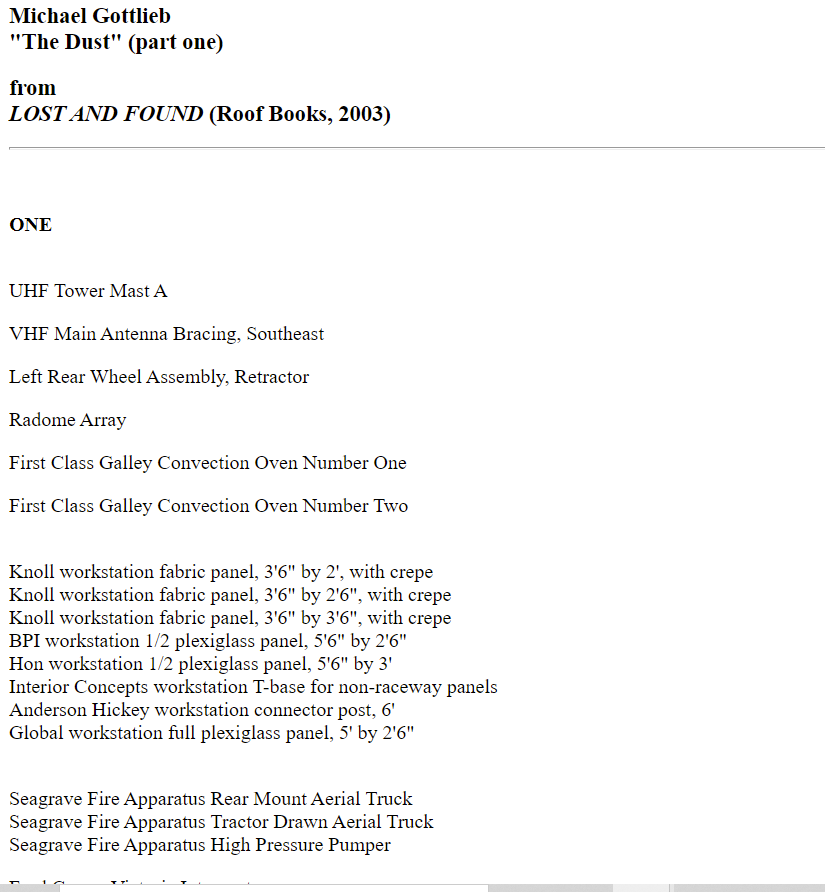The Dust, Michael Gottlieb
From Against Expression, Edited by Kenneth Goldsmith and Craig Dworkin:
282:
Without hypotaxis, narrative, or discursiveness, “The Dust” (Lost and Found [New York: Roof, 2003]) depends on a reader’s knowledge of its context: the collapse of the World Trade Center towers on September 11, 2001. Not a strict transcription of objects pulverized or recovered from the site (some of the items included are the products of Michael Gottlieb’s imaginative speculation rather than research), the poem nonetheless evinces the power of the detached and flatly unexpressive catalog to access emotions—through strategies of obliquity and indirection—without courting blatant sentiment. The catalog at play here is not just the organizational form of the list, of course, but also the style of the wholesale product brochure; the language of the poem is closer to commercial accounting than to the traditional lyric elegy. The defamiliarizing specificity and descriptive detail of Gottlieb’s litany slows the reader and helps forestall—if only momentarily—the stock, reflexive, or scripted responses to the strongly mediated spectacle of the attacks. Where September 11 has become a symbolic event of shared cultural reference, “The Dust” reduces the monumental status of both the towers and their demise to a scale of concrete and individual particulars.
From Publisher’s Weekly:
“The Dust” is a list poem, one that tallies, in trade catalogue language (“Interior Concepts workstation T-base for non-raceway panels”), some of the things that got compacted when the World Trade Center towers fell. When Gottlieb finally, and with extreme care, transitions from products to people’s names, the juxtaposition of financial, bureaucratic and personal losses seems to make the ground fall out from under everyday life. The poem is sad, frightening and extraordinary, and while it honors the dead, it also refuses to separate them from the things with which they lived.
Seton Identification Products, 30339V, "Emergency Exit Only Alarm Will Sound" Avaya Merlin 34 button Deluxe BIS-D telephone set, with 6' handset cord Myst III: Exile, for Windows 98, CD-ROM, Ubi Soft Entertainment, Inc. Johnson & Johnson Bandaid Brand Adhesive Bandage, 1/2" by 3" Picture Frames By Umbra, Fits Pictures 3 1/2 by 5 Daniel C. Lewin C++ For Dummies, Stephen Randy Davis, 4th Edition, IDG Books Lite Source, Inc. portable lamp, Model BF51520 Totes Automatic collapsible umbrella, Black Fisher Price "See N Say" Baby Says John J. Tipping, II At-A-Glance Reversible Erasable Wall Calendar, 36" by 24" Instinet Russell 1000 Reconstitution Preview - update, pdf Bordeaux, La Fleur, Petrus, 1998, 750 ml Alysia Basmajian Orchid, Cattleya Leopoldii Kwikset Titan key Michael Quilty Alban Berg's Wozzeck, The Metropolitan Opera, September 26, 2001, Orchestra, AA110, AA111 Julio Minto Balanca Rollerblade, ABEC X10 Extenblade Kiran Reddy Gopu John Patrick Salamone Hartmann 44" Overnight Lite Garment Bag Ching Ping Tung Sushil Solanki Lyudmila Ksido Coffee, regular, sesame bagel, toasted with cream cheese
Kenneth Goldsmith’s work is reproduced here with the blanket permission he has publicly given with his “usual arguments against creativity and for copyleft, file-sharing, and free culture” (2013). As he says in UbuWeb, his huge online archive of conceptual writing, avant-garde, ethnopoetics, and outsider arts: “For the moment, we have no competition, a fact we’re not happy about. We’re distressed that there is only one UbuWeb: why aren’t there dozens like it? Looking at the art world, the problem appears to be a combination of an adherence to an old economy (one that is working very well with a booming market) and sense of trepidation, particularly in academic circles, where work on the internet is often not considered valid for academic credit. As long as the art world continues to prize economies of scarcity over those based on plentitude, the change will be a long time coming. But UbuWeb seeks to offer an alternative by invoking a gift economy of plentitude with a strong emphasis on global education.” ForBoredom aims to be that competition!

Leave a Reply